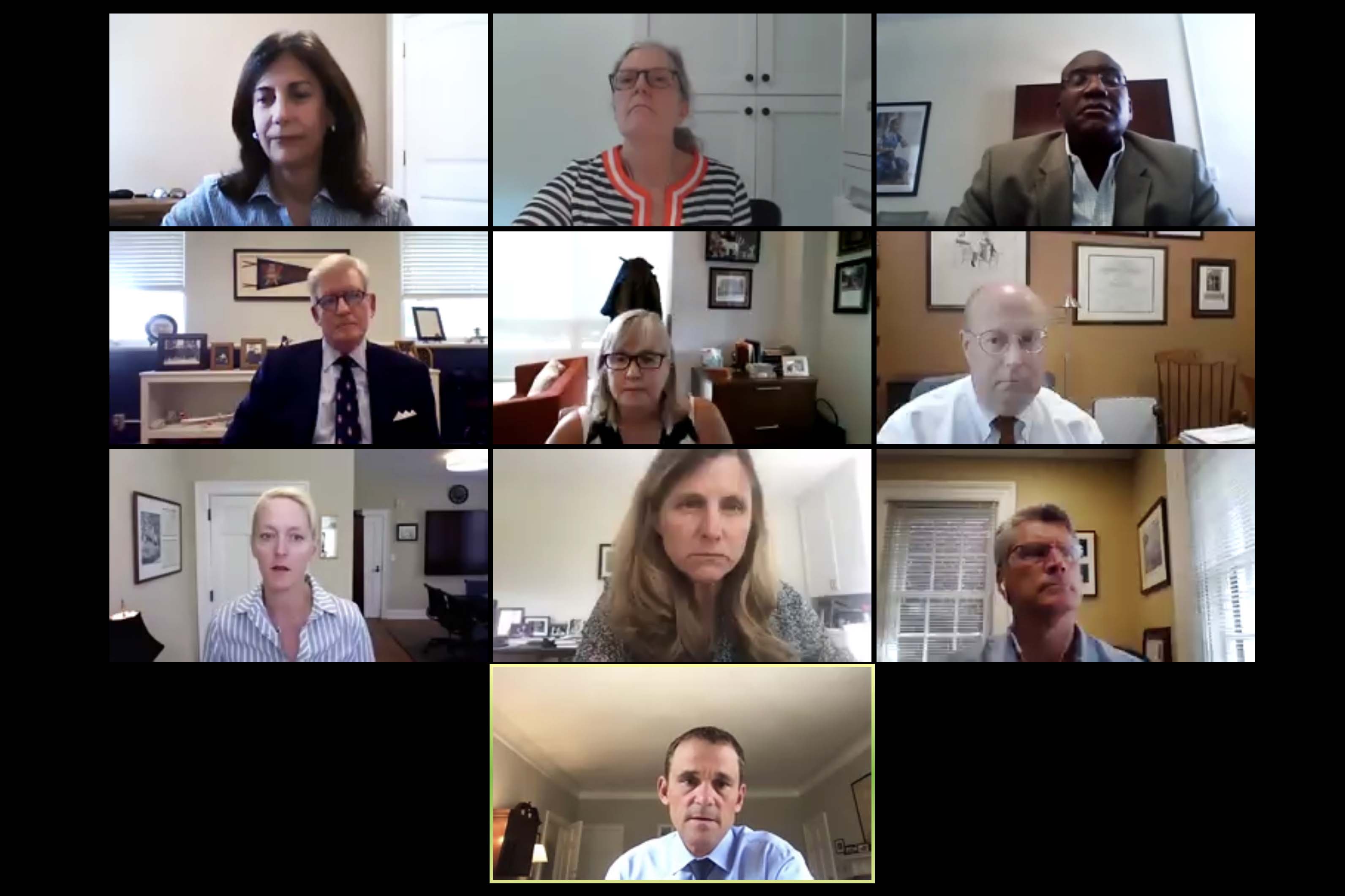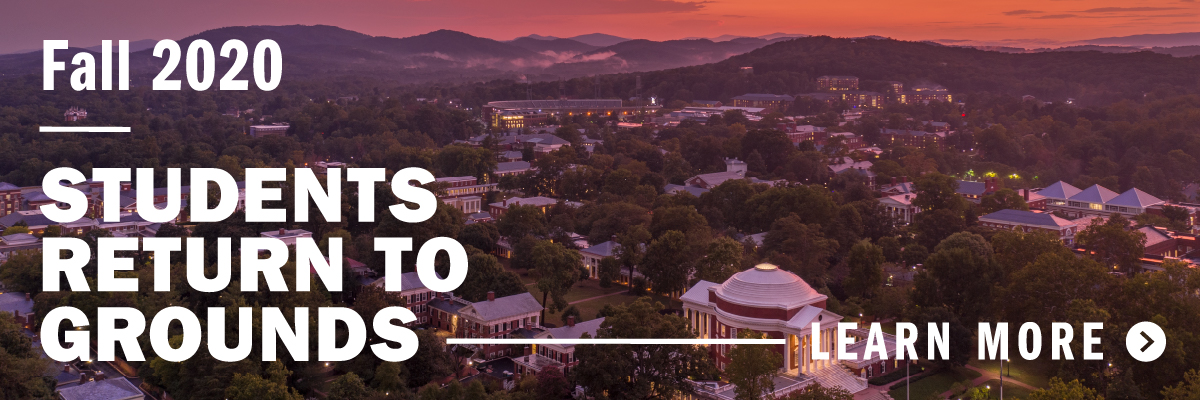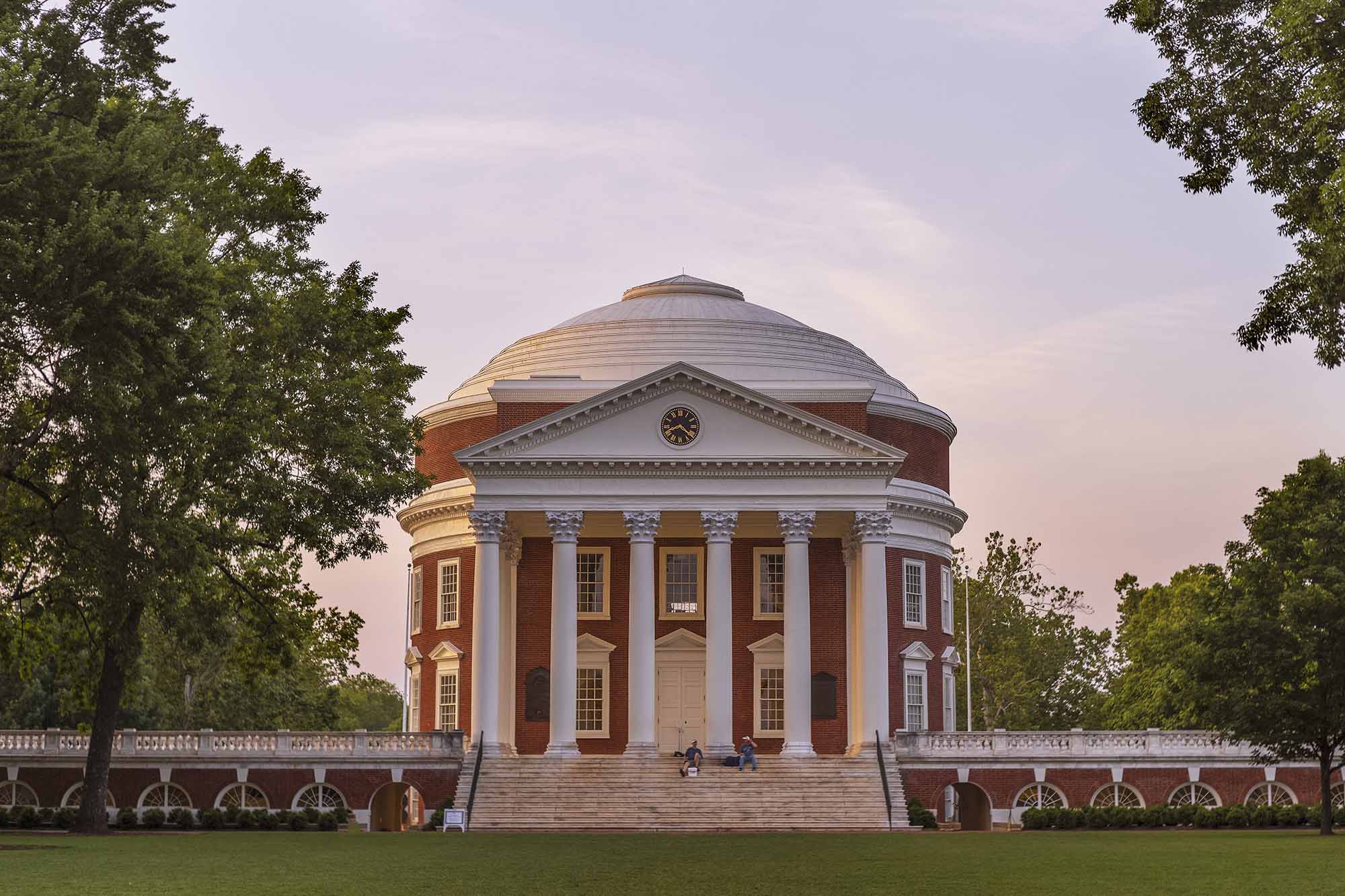University of Virginia leaders hosted a virtual town hall Friday afternoon for students’ parents and families, following two recent town halls addressing students, faculty, staff and community members.
UVA President Jim Ryan began the session by thanking students’ families for their cooperation and noting that several leaders on the panel also have college-aged children, himself included.
“I sympathize with what many of you as parents and guardians are feeling, as the father of two college-aged sons,” he said. “I am really eager for them to be able to return to college, see their friends, take classes and be independent, but at the same time I am worried about the risks.
“Our approach has taken exactly that perspective, which is that we would like to have your student back on Grounds, but only if we can do so in a reasonably safe way. That is why we have spent a lot of time over the last few months working on health and safety measures.”
Speaking via teleconference, Ryan was joined by Provost Liz Magill, Executive Vice President and Chief Operating Officer J.J. Davis, Vice President and Chief Students Affairs Officer Pat Lampkin, Associate Vice President and University Dean of Students Allen Groves, Department of Medicine Chair Dr. Mitchell Rosner, Vice Provost for Academic Affairs Archie Holmes, University Counsel Tim Heaphy, Assistant Vice President for Economic Development Pace Lochte and Assistant Vice President of Student Affairs and Executive Director of Housing & Residence Life Gay Perez.

Friday’s virtual town hall was specifically designed for students’ parents and guardians and included leaders from across UVA.
Each leader gave updates on various parts of the University’s COVID-19 response, from virus testing plans to the expectations and norms students must follow if they return to Grounds for the fall term. A full video recording of the town hall is available here.
In addition to updates offered in the students, faculty and staff town hall and the community town hall, Friday’s session offered information of particular interest to parents.
Rosner, for example, went through the public health criteria that University leaders are monitoring daily in order to make a final decision about the fall semester by Aug. 28, including viral prevalence, operational readiness, protective equipment supplies and capacity at UVA Health, and more.
Leaders also noted an important change in the dates for student virus testing, asking all students who have not yet traveled to Grounds to take and send their self-administered COVID-19 test between Aug. 20 and Aug. 25 so that results will arrive on time. Students who are already in Charlottesville should take and send the test as soon as possible, and students who are under 18 or currently living internationally will receive separate instructions for their circumstances. More information about student testing is available here.
Magill and Holmes reviewed measures faculty members are taking to connect with students, both virtually and, where possible, in-person or in small groups. Roughly 27% of courses offered this fall will have an in-person component, Magill said. Faculty are also exploring other in-person options, such as outdoor meetings, office hours and other small group gatherings.

“Our faculty are working hard to think about in-person experiences or smaller experiences in classes that are online to give students more direct contact with faculty,” she said.
Holmes reiterated that faculty and staff are eager to preserve a strong sense of community.
“What is special about the UVA experience is the interaction with faculty and students,” he said. “We have been working really hard to help our faculty be prepared to provide that to your students in a variety of ways.”
Davis explained various safety measures being instituted around Grounds, including protective equipment for students, faculty and staff; Plexiglas barriers; thousands of hand sanitizer stations; enhanced cleaning protocols; and signage to assist with physical distancing. She also explained modifications to some student services, including libraries, dining halls, gyms and buses, and creative measures staff will take to provide new spaces for students to safely study, eat or meet in small groups, such as tents erected around Grounds.
Lampkin, Heaphy and Groves went through the expectations and norms students must follow, including wearing a mask in public settings, practicing physical distancing and gathering only in small groups with an upper limit of 15 people. These expectations, Heaphy noted, apply throughout the Charlottesville community and will be enforced both by peer education and, where necessary, additional sanctions, including suspension of individuals or organizations.
“Our standards of conduct have always applied in the community, not just on University Grounds, and these important protections will cover students’ conduct in and around the University, including their off-Grounds residence,” Heaphy said, pointing out that faculty and staff will be held to the same standard. “This is a communal obligation that we have to each other, and it is important that everyone physically present in our community agrees to do their part to keep themselves and others safe.”
Lampkin and Groves also explained measures students, faculty and staff are taking to create a sense of welcome and community even in these strange times. Orientation leaders, for example, have been in touch with first-year and transfer students throughout the summer, and resident advisers in each dorm are already preparing to welcome their new residents.
“I want to assure you, especially parents of first-year and transfer students, that despite the disrupted rhythms of this fall, our basic structures, framework and philosophy remain the same for helping your student become acclimated to college life,” both for students on Grounds and those studying at home, Lampkin said.
Some seminal University events, such as Fall Convocation or the Student Activities Fair, will still take place, but in a virtual form, according to Groves, and student groups are working on other creative ways to build community.
“This will be a different semester than we are used to, but there are ways that we are working very hard to create community and create that quintessential UVA experience that we are known for,” Groves said.
Leaders also took questions from participants on topics including housing and move-in dates, symptomatic and asymptomatic testing plans, plans to work with sororities and fraternities on compliance measures, and much more.
Answers to those questions, and to many questions that did not get addressed in the hourlong town hall, are available on the Return to Grounds site and the Fall 2020 Student Resource Site.
Media Contact
Article Information
August 14, 2020
/content/leaders-review-fall-plans-parents-and-families-friday-town-hall

